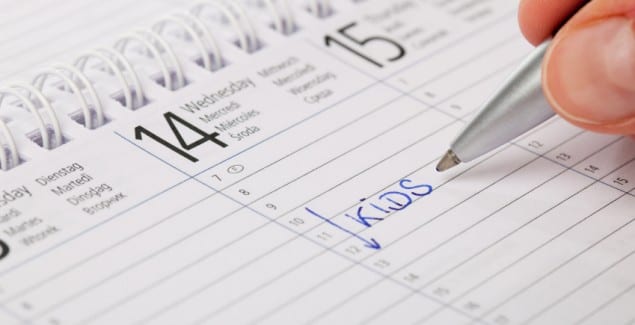Over-Scheduled, Stressed-Out Families

Posted in: Hot Topics, Podcast, You & Your Family
Topics: Stress
You can also listen to this podcast on iTunes, Spotify, Google Play, Stitcher, TuneIn, SoundCloud, and most podcast apps – just search for “Shrinking It Down.”
A contemporary belief is that it’s our job as parents to make our beloved children successful, and to do so we must start focusing on skill development as early as possible—if not by playing Mozart to the womb, at least by enrolling children in enrichment programs by age 2. We all want our children to succeed, and worry about whether they can measure up academically, athletically, or artistically in today’s hyper-competitive world. So people like Amy Chua, the author of the Battle Hymn of the Tiger Mother, who emphasizes that success requires a regimented, highly-scheduled approach to child-rearing, have no trouble getting our attention. Her book was controversial not only because her relentlessness was horrifying, but also because her methodology seemed to work (after all, her daughter is at Harvard!).
We see this issue very differently: this over-scheduled approach to child-rearing is a serious health hazard. Though this frenetic lifestyle has become the norm, we’ve seen it wreak havoc with children’s health. Transforming kids’ play into work where they are pressured to excel has infused family life with anxiety and strife. This is damaging to the health and emotional well-being of children and parents alike!
Child psychiatrists and pediatricians frequently see over-scheduled families. A mother worries about her 8-year-old daughter’s headaches, gastric distress, tics, or fatigue. The pediatrician asks about after-school activities, and the devoted but frazzled mom answers proudly for the child: “Monday, there’s soccer and math tutoring; Tuesday, there’s soccer and piano; Wednesday, there’s religion school; Thursday, there’s a double soccer practice. Friday is free, which is good for play dates, since Madison plays in two soccer leagues with weekend games Saturday and Sunday!” No wonder mom and daughter are exhausted!
By teaching teamwork, providing social connections and helping kids find their passions, activities are indeed enriching. However, like Tylenol, more is not better—not only does more not bring down the fever better or faster, too much is toxic. Similarly, losing the balance between scheduled enrichment and relaxed family time is harmful, too—to your child’s sense of self, individuality, creativity, imagination, equanimity and health.
Many kids like sports; some love them. But, is it really necessary to travel across several states to find soccer and gymnastic teams where fourth graders can compete at their “level?” What happens to family life when hockey practice starts at 5am every single day, including weekends? Should second-graders really be competing in a national “Final Four” basketball tournament?
All of this takes a toll on family life; the medical fall-out is also substantial. For example, childhood ACL tears have increased ten-fold in the past decade. High school football players who’ve suffered multiple concussions hide their compromised mentation, insisting that they have to play the next game lest they miss being recruited for college teams. Ironically, the net result of this professionalization of recreation is that, by age 13, nearly three-quarters of young athletes drop out of organized sports. It’s not much of a stretch to wonder whether the resulting lack of exercise is contributing to America’s obesity epidemic.
For our kids, self-esteem is rooted in what they perceive our opinions of them to be. Envision a 9-year-old soccer player who hears his dad screaming at him from the sidelines: “How can you miss that opening?! Get with the game!” The subliminal message this young boy receives is, “I’m not very good.” A child constantly urged to do better can’t help but believe that his parents don’t have much faith in him. Sadly, this can become a self-fulfilling prophecy where the child “lives down” to his parents’ perceived expectations.
The pressure to excel at everything leaves some children feeling depressed, despondent and/or rebellious. At younger and younger ages, they start to drink to relieve emotional distress, or use illicit substances to escape. In fact, suburban teenage substance abuse is linked to the pressure with which these kids live. As one depressed, substance-abusing patient said, “In my family it’s Harvard, Yale or nothing…and I just can’t measure up.”
We believe that parenthood is a far higher calling than managing a complicated schedule of practices, lessons and tutoring sessions. To have enough energy and good humor to nurture your children, we parents need a life, too. All too often our intense family schedules, combined with work and economic pressures, leave us with the same anxiety, depressive and stress-related disorders as our children.
Parent Strategies for Reducing Stress
How can you do better? Like all good parents, you probably sacrifice plenty for your kids. If you think your family is over-scheduled, keep a few principles in mind:
- Saying “no” to the occasional enrichment opportunity won’t endanger your children’s future. Consider what your family can tolerate comfortably. If adding another activity will overload you, resist pressure from coaches and peers who insist you must say “yes.” Making hard, sensible choices is what we adults should model for our families. Isn’t this what we ask when we tell them to just say “no” to poisonous temptations?
- Martyrdom is no model for a good adult life. Self-sacrifice does not equal good parenting. Being happy with our own lives is a wonderful gift to give our children. We all need time for our marriages, our friendships and ourselves.
- Aim for equilibrium—stopping activities entirely is neither feasible nor advisable, but cutting back just a bit (5-10%) may bring a better balance.
- Nothing means more than family time. Be unproductive sometimes—spend time together with only one goal: enjoying one another. Take the time to listen to your kids when they are ready to talk.
- Do parenting your own, idiosyncratic way. Raising children is an ever-changing ballet, a dance between parents, children, spouses, extended family, friends and the community. With each child, we perform new and different moves that we’ve never done quite this or that way before. It’s not always graceful (actually, it’s sometimes uncomfortable and awkward as all hell), but when it comes to your child, no expert dances better than you!
For children, spending time with tough coaches is far less enriching than spending time with a mom or dad who enjoys their company. This bolsters their self-esteem more effectively than anything else.
Seeing yourself appreciated in a parent’s eyes is how you develop the deep, inner conviction that you are worthwhile and deserving of love. As singer/songwriter Billy Joel put it, “There’s no need for clever conversation. I love you just the way you are.” Doesn’t that enrich everyone?


 Share
Share Tweet
Tweet








